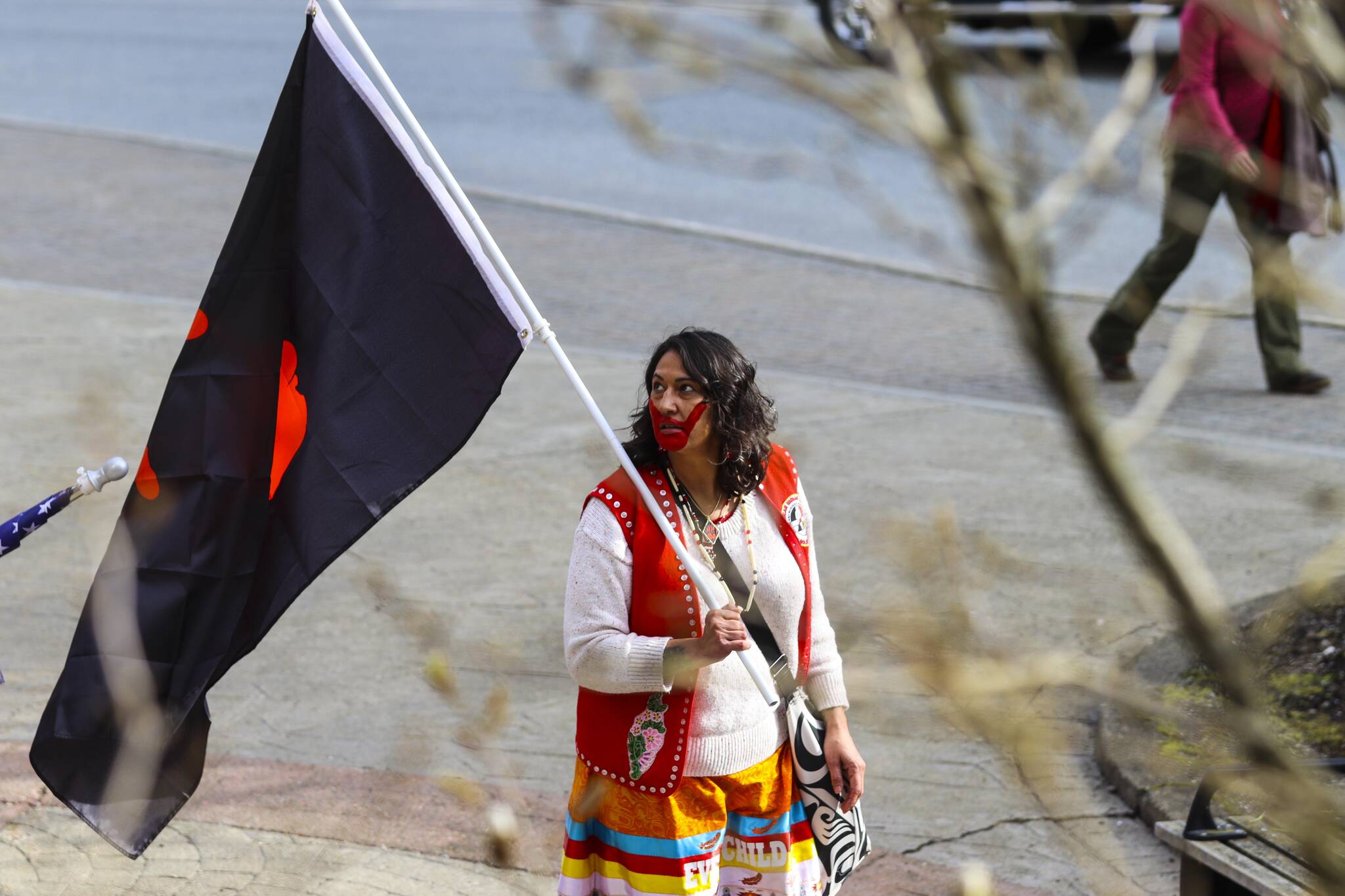Adorned with red handprints across their mouths and carrying signs bearing the faces of the missing, hundreds gathered Thursday afternoon at the Alaska State Capitol.
Local officials and Alaska Native dignitaries spoke before a solemn crowd as wind played with flags bearing the red hand symbolizing the missing and murdered Indigenous persons awareness movement. The rally expanded the scope to violence against all Indigenous people and was held on Missing or Murdered Indigenous Persons Awareness Day.
“I think the turnout was great. The message was shared across the state through representatives. It’s gaining more attention on national levels through political streams,” said Jamiann Hasselquist, who took part in the rally. “That’s exactly what we need. We need other people to amplify our Indigenous voices and come up with solutions for this epidemic.”
Speakers emphasized the need to reinforce the values that made the Alaska Native cultures resilient. Native Americans and Alaska Natives experience some of the highest rates of violence in the country, and Native women and girls in particular sustain appallingly high rates of sexual and gender-based violence in addition to disappearances, according to a U.S. Department of Justice news release.
“Our children have been pulled from us,” said Paul Marks, community elder and speaker at the march. “They’re our children. And they’re gone.”
Allies and improvements
The issue of missing and murdered Indigenous people has been a contentious one in Alaska, where President Joe Biden recently signed an executive order ordering multiple federal departments to work directly with tribes in order to improve public safety and criminal justice for Indigenous people.
“People are still looking for answers. With Anne Sears coming back onto the force, I’m really excited to see what kind of work she’s going to do and what she’s going to accomplish,” said Jamiann Hasselquist, who attended the rally. “There’s a lot of cases that have been mishandled and in my opinion neglected. I’m hoping she can get some answers for the cases but more importantly for the families.”
Anne Sears, newly announced investigator for the state of Alaska’s MMIP Initiative, also spoke during the rally. Sears, who is Alaska Native, began her career at the Juneau Police Department before going on to a 22-year career in the Alaska State Troopers, retiring and transitioning to the MMIP Initiative.
“We will not let our children go missing. We will not let our women suffer under violence,” said state Rep. Sara Hannan, D-Juneau, during the event. “We will not let it tear our communities down.”
Other state, local and city representatives attended the march, including JPD Deputy Chief David Campbell, and state Rep. Andi Story, D-Juneau, who also spoke.
“Thank you for standing up for justice today,” Story said.
Native speakers voiced their appreciation for the support, but urged officials to work with Alaska Natives on their terms to stop the scourge.
“We have heard you, those who are working for the state. You want to help us,” Marks said. “Work with us with kindness and respect. We don’t want to be talked down to. We don’t want to be treated like children. We are a proud people. A strong people.”
Half-measures would not cut it, said X’unei Lance Twitchell, one of the speakers.
“To make a new day, we have to make a bold move,” Twitchell said. “We have to create a shift.”
Central Council of the Tlingit and Haida Indian Tribes of Alaska offers logistical support for families doing search and rescue, Hasselquist said. There’s also the Red Blanket Fund, administered by the Na’ah Illahee Fund, which offers financial assistance in the form of a grant to Native American and Alaska Native families searching for a missing family member, or dealing with the many steps that come after the search.
“Everything has led to this”
Sears entered the job leading the MMIP initiative, funded by a U.S. Department of Justice grant, in early April.
“It feels like everything that I’ve done, everywhere that I’ve been and where I worked, everything has led to this,” Sears said in an interview last week. “It’s an honor to be asked and it’s a privilege.”
Sears, who lived all over the state but for many years in Juneau, said that experience will help.
“Working in rural Alaska gave me an edge. I was in rural Alaska for 15 years in Nome and Kotzebue. Those were hub communities. I would go out to the smaller communities to work,” Sears said. “You need to connect with folks. You’re going to need a ride. You need to find somebody. You need to work with folks.”
Much of her work as the first person to be appointed to the role will be defining what it does, Sears said.
“The scope of my position is evolving since it’s new and I’m feeling my way through it. Before I took the position I definitely had a couple of cases I wanted to look at,” Sears said. “It’s not like we haven’t been investigating MMIP. As far as the initiative, I’m the first person in it, and hoping to lay the groundwork for the next person.”
Some of the work will involve putting a fresh set of eyes on cases and seeing if something new is apparent, while also establishing new partnerships to bridge the gap between the Native communities and the state government, Sears said.
“That is one of my goals before I re-retire is to establish partnerships with our tribes here in Alaska,” Sears said. “It’s going to be case by case. I don’t know if it’s necessarily going to be reinterviewing. It’s putting new eyes on it and seeing if anything pops out at me, seeing if there’s anything I can investigate.”
Sears said the job will involve quite a bit of travel and getting face to face, and encouraged people with information or concerns about a missing person to reach out to her at the Department of Public Safety.
Contact reporter Michael S. Lockett at 757-621-1197 or mlockett@juneauempire.com.

